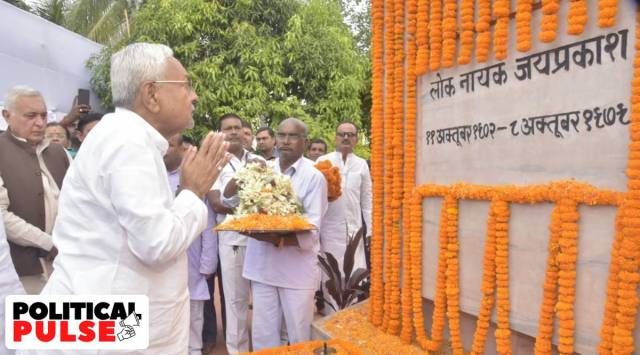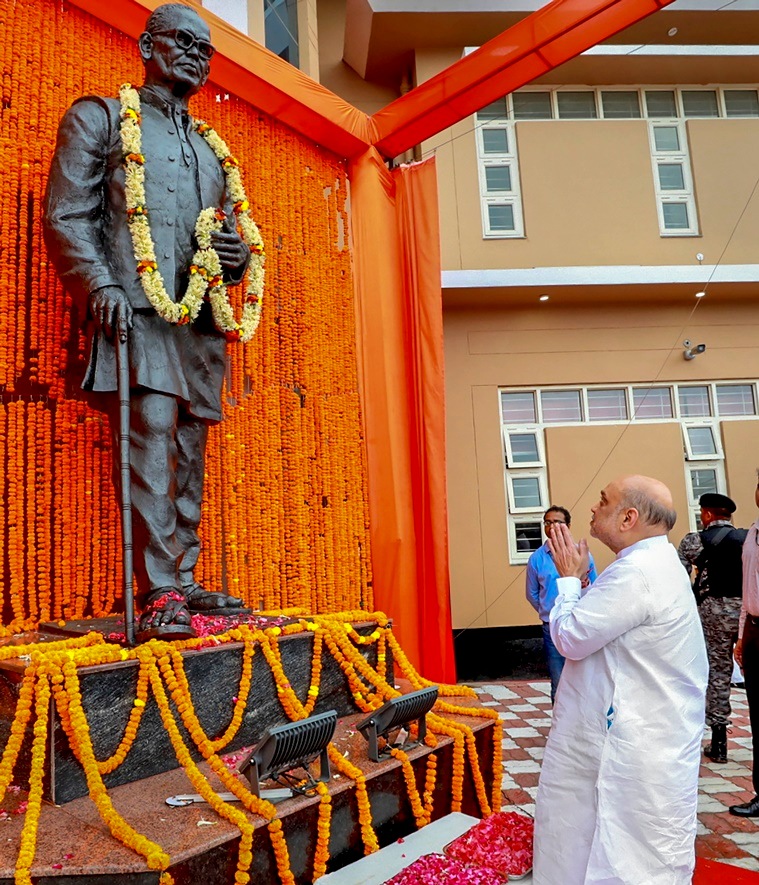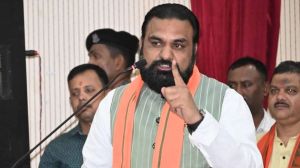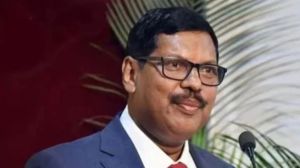Where is Naga peace accord: Nitish invokes JP’s Nagaland link to attack Modi govt
The late leader had played a crucial role in signing of peace accord between Naga rebel forces and Army; Nitish was addressing an 'All India Bihari Conference' at Dimapur.
 Nitish Kumar pays tribute to Jayaprakash Narayan on his birth anniversary. (Twitter/@NitishKumar)
Nitish Kumar pays tribute to Jayaprakash Narayan on his birth anniversary. (Twitter/@NitishKumar)As Union Home Minister Amit Shah landed in Jayaprakash Narayan’s village in Bihar to mark his 120th birth anniversary Tuesday, JD(U) leader and Bihar Chief Minister Nitish Kumar included Nagaland among other places in his itinerary to honour the leader.
Nitish, like almost the entire top brass of Bihar leaders, was a product of the JP Movement. Nagaland, which goes to elections in 2023, was a strategic choice to honour JP, with Nitish – speaking at the ‘All Nagaland Bihari Conference’ at Dimapur – underlining “the contribution of Biharis in the political and economic sphere of Nagaland” since the days of the late leader.
JP had played a crucial role in the signing of the peace accord between the Indian Army and Naga rebel forces, and Nitish, who recently split with the BJP and has set his eyes on the national stage, used the occasion to target the Modi government, and specifically Shah as Home Minister, over the stuck Naga peace talks.
JD(U) presidents of Manipur and Arunachal Pradesh as well as veterans who had served with JP in Nagaland in the 1960s joined the Dimapur rally. The Bihar government last month announced the release of Rs 2.55 crore for 2,495 beneficiaries of the ‘JP Senani Pension Scheme’ and their spouses in Nagaland.
“Prime Minister Narendra Modi and Home Minister Amit Shah signed a framework agreement for Naga peace in 2015. All groups involved with the Naga movement and the Government of India signed the agreement. We thought it was a great thing. But it has not been implemented yet. It’s baffling,” Nitish said.
The NSCN (I-M) has been in talks with the Government since 1997, when it announced a ceasefire. In 2015, one year after Modi first came to power, the Centre announced the signing of the Framework Agreement with the NSCN (I-M) with much fanfare.
While details of that agreement are still to be clarified, in 2017, the Centre opened parallel talks with the Naga National Political Groups (NNPGs), an umbrella body of seven Naga organisations. Recently, the NSCN (I-M) and NNPGs declared that they were committed to dialogue for peace.
“Our demand is to immediately start implementing the provisions of the Naga Peace Accord,” Nitish said, adding that wherever his party goes, it will tell the people about this unkept promise of the Centre. “We shall do whatever is possible for us for the rights and development of the people of Nagaland.”
 Union Home Minister Amit Shah pays tribute after unveiling a statue of Loknayak Jayaprakash Narayan, in Sitab Diara, Bihar. (PTI)
Union Home Minister Amit Shah pays tribute after unveiling a statue of Loknayak Jayaprakash Narayan, in Sitab Diara, Bihar. (PTI)
Speaking about his government in Bihar, the JD(U) leader said it works on the principles of Mahatma Gandhi, Ram Manohar Lohia, JP, B R Ambedkar and Karpoori Thakur. Bihar was the first state to introduce 50% reservation for women in three-tier panchayat elections apart from other pro-people schemes like distribution of bicycles, he said, adding that all states that were still backward needed special category status that he was fighting for in Bihar.
JD(U) president Rajiv Ranjan Singh, who also addressed the gathering, urged people to have faith in JP’s legacy and said their party wanted to follow through for peace in Nagaland.
Bihar minister Sanjay Jha said JP had called for “sampurna kranti” or total revolution at a time when there was no direction in sight for the country, and said Nitish was taking forward his development goals on the lines of JP’s ideology. “Nitish Kumar is walking bearing a new light, for a new chapter for the nation. When all roads are closed, Bihar shows the way,” he said.
Again signalling the JD(U)’s national ambitions, Jha said: “The whole country is looking towards our Chief Minister, towards an honest leader.”



- 01
- 02
- 03
- 04
- 05




























